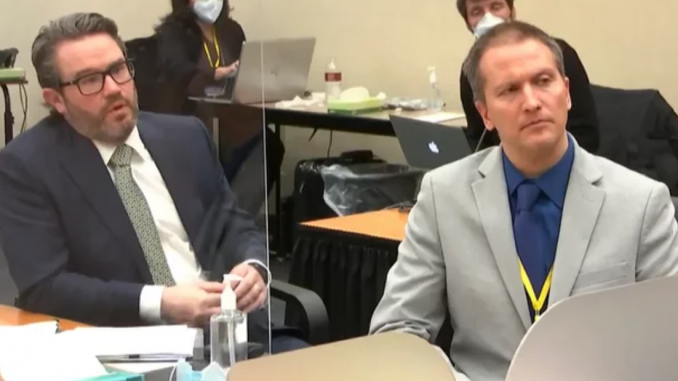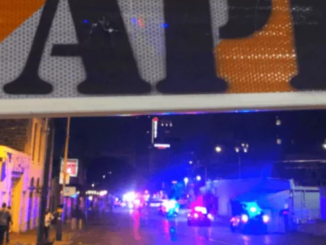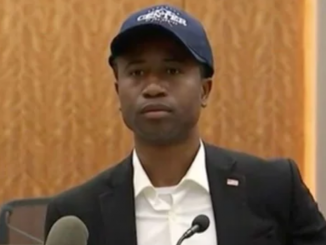
MINNEAPOLIS — The jury has found former police officer Derek Chauvin guilty on all counts in the murder of George Floyd last May.
Chauvin, 45, was found guilty of second- and third-degree murder and second-degree manslaughter.
The former officer, who is white, was seen on video pinning George Floyd, a 46-year-old Black man, to the ground with his knee last Memorial Day for over nine minutes after police responded to a report that Floyd used a counterfeit $20 bill.
Cell phone video of the incident went viral and touched off months of protests in the U.S. and abroad condemning police brutality and calling for racial justice. The widely watched trial, which began in March with jury selection, was livestreamed – Minnesota’s first criminal case to be televised.
If convicted of the most serious charge, Chauvin faces 12 1/2 years or 150 months in prison under sentencing guidelines for a first-time offender. But, the prosecution argues there are aggravating factors that require a longer prison term. That means Chauvin may face longer than that sentence.
Throughout the trial, prosecutors argued that Chauvin’s knee – pressed against Floyd’s neck while he was handcuffed and face-down on the street – led to his death by loss of oxygen. The defense argued underlying heart issues and the methamphetamine and fentanyl in his system caused Floyd’s death while he struggled with police.
The prosecution rested its case last week after calling 38 witnesses and playing dozens of video clips over the course of 11 days. The defense rested Thursday after calling seven witnesses over two days. Attorneys for both sides presented their closing arguments Monday.
Outside the courthouse, more than 100 reporters and a small number of neighborhood activists assembled to hear the verdict. For the first 20 minutes after the announcement that the verdict had been reached, a flood of office workers left downtown, their vehicles jammed up along the streets.
George Floyd’s girlfriend, Courtney Ross, spoke briefly to reporters before the verdict was read. “I think he would say let’s start taking care of each other,” she said as dozens of journalists crowded around her.
“This is so traumatic. We need a guilty verdict. We need to heal. We need to heal,” said Amber Young, 50, a food services coordinator who worked at the same Salvation Army mission Floyd had.
Young waved a Black Lives Matter flag outside the Hennepin County Government Center while waiting for the verdict. “We’ve been grieving. Seeing the video over and over again was traumatic,” she said. “We need to heal. We need a guilty verdict.”
Ahead of the verdict, officials were tightening security across the region and nationwide.
During the trial, thousands of police and members of the National Guard were activated in Minneapolis, with guard troops carrying unloaded rifles at key intersections.
For the people living and working downtown, the security measures mean road closures and armed soldiers patrolling the streets. Downtown Minneapolis has largely been boarded up. The few stores and restaurants still open were hanging “Open” signs on plywood protecting their glass. Public schools are returning to remote learning Wednesday, and school officials warned parents that violence could break out.
City leaders said they are worried not just about anti-police protests but the possibility that white nationalists might seize the moment to sow chaos.
Meanwhile on Monday, Minnesota Gov. Tim Walz issued a peacetime emergency declaration for seven counties citing the potential for “further civil unrest” following protests over the police shooting death of Daunte Wright just north of Minneapolis and the anticipation of additional events following the Chauvin jury verdict.
The action allows federal law enforcement and police from other states to assist Minnesota state agencies in quelling any violence.
Here’s a breakdown of the Minnesota criminal charges against Derek Chauvin.
Second-degree murder is causing the death of a human being, without intent to cause that death, while committing or attempting to commit another felony. In the Chauvin case, the alleged felony was third-degree assault.
Third-degree murder is unintentionally causing someone’s death by committing an act that is eminently dangerous to other persons while exhibiting a depraved mind, with reckless disregard for human life.
Second-degree manslaughter is culpable negligence where a person creates an unreasonable risk and consciously takes the chance of causing death or great bodily harm to someone else.
*story by USA Today


